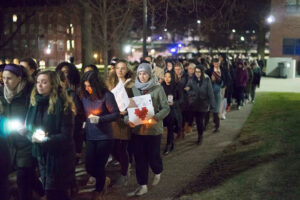by The Cowl Editor on February 3, 2017
News

by Daria Purdy ’19
News Staff
Immigration practices in the United States underwent a significant change this previous week. President Donald Trump signed an executive order on Friday, January 27, that specifically affected certain groups of immigrants.
The executive order indefinitely banned Syrian refugees from entering the United States, suspended all refugee admissions for 120 days and blocked citizens of seven countries from entering the United States: Iran, Iraq, Libya, Somalia, Sudan, Syria, and Yemen.
The order does not pertain to naturalized citizens from the seven named countries, but it does apply to students, visitors, and green-card-holding legal permanent residents.
The order ran into immediate opposition throughout the country. Acting Attorney General Sally Yates ordered the Justice Department not to defend the executive order in court, and was fired for her actions.
Federal judges in New York, Massachusetts, Virginia, and Washington all made rulings that blocked part of Trump’s order.
A Brooklyn judge ruled that travelers being held at airports across the country should not be deported back to their own countries. At least 100 diplomats from the State Department signed a dissent memo that expressed opposition.
On a grassroots level, protests erupted in airport terminals throughout the country, including airports in New York, Atlanta, Washington, and Dallas. On Jan. 28, lawyers flocked to O’Hare International Airport to volunteer their services to those being detained in the terminal. Crowds formed and protests were staged in Boston’s Copley Square, Manhattan’s Battery Park, and outside the White House.
The Providence College community was affected by the executive order and its consequences. Father Brian Shanley, O.P., told students, “This is a time of great confusion which calls us to respond in the light of our Catholic values.” Father Shanley also emphasizes that “as a Catholic and Dominican institution, we are committed to authentic hospitality. We welcome and embrace people of every nation and of every faith.”
The feelings of PC students towards the recent events were expressed by the Solidarity Walk, organized by the Board of Multicultural Student Affairs, which took place around campus on Jan. 29. Olivia Lo ’18, BMSA Executive Secretary, said the walk, “allowed us to show support to marginalized groups such as the Muslim population, immigrants, women, people of color, and those of the LBGTQ+ community.” The walk began in Moore Hall, and as it moved around campus its numbers swelled to around 200 students. The walk traveled through both Alumni Food Court and Raymond Hall, where many students were eating their dinners. Silence spread as the walkers appeared, interspersed with occasional applause or shouted comments. The participants linked arms, and many held signs with slogans such as “the future is diverse,” “we are all humans,” “stand for one stand for all,” and “seeking asylum is a human right.”
BMSA President Pedro Alemán ’17 said the organization provided “an opportunity to do a Solidarity Walk around campus to show support for our fellow brothers and sisters, family and friends. We walked with candles and signs to show our fellow PC community that there are members in this very campus who have fallen victim of these policies.” Lo elaborates, “The Friar Family should stand up to policies that suppress human rights and support those who may have been hurt or could be hurt. BMSA refuses to be bystanders of these new orders, and hope the Friar Family does as well.” Lo also offered her sincere thanks for those students who participated in the walk. For anyone who would like to learn about helping marginalized groups, Lo mentions some upcoming conferences. “UndocYOUniversity” will take place on March 21 and will be free to PC students. The “Drive RI” conference will take place on March 24-25 at the University of Rhode Island.